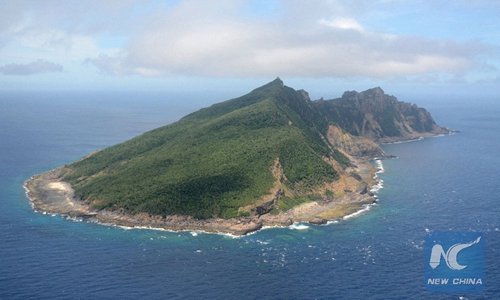
Diaoyu Islands in the E China Sea Photo: Xinhua
China and Japan are expected to hold another round of high-level consultations on maritime affairs on Thursday, Japanese media reported on Saturday. However, Chinese experts believe that the results of the talks will be "very limited," given Japan's evasion of the historical facts of the Diaoyu Islands and its recent provocations to China.
It will be difficult for the two sides to reach a constructive consensus, but the smooth operation of the dialogue mechanism is positive for the region, experts told the Global Times.
At the meeting, China will be represented by Hong Liang, director-general of the Department of Boundary and Ocean Affairs of the Foreign Ministry, while Japan is sending the head of the Asian and Oceanian Affairs Bureau of Japanese Foreign Ministry Takehiro Funakoshi, according to Kyodo News.
The Diaoyu Islands issue is the biggest dispute between China and Japan in the East China Sea region and is expected to be the core topic of the upcoming talks, Liu Jiangyong, vice dean of the Institute of Modern International Relations at Tsinghua University, told the Global Times on Sunday.
The Diaoyu Islands have been an inherent territory of China since ancient times. However, "due to the propaganda of successive Japanese administrations on this issue, the Japanese people believe that the Diaoyu Islands are Japan's territory," Liu said. "So many Japanese people think that Chinese official ships operating near the Diaoyu Islands are intruding into Japan's territorial waters. This misperception should not continue to exist."
In November, 2021 the two sides confirmed in a
director-general level meeting that they would adhere to the four-point principled consensus between China and Japan, strengthen dialogue and consultation on maritime affairs and constructively manage differences.
However, more than six months after this meeting, the atmosphere of cooperation between the two sides for the joint development of the Diaoyu Islands, which had been previously agreed upon, has been completely destroyed by Japan, experts noted.
For China and Japan, the issue of the Diaoyu Islands is a historical one that is difficult to solve overnight. Observers noted, however, the establishment of a rational, professional and stable dialogue mechanism between the relevant Chinese and Japanese functionaries is positive for the region.
Some observers believe that Tokyo has adopted the most vicious China-policy since ties were normalized 50 years ago, as Japan keeps flirting with China's hot-button issues such as the Taiwan question, and is reportedly aiming to send an active-duty defense official to Taiwan island to strengthen information-gathering capabilities. Japan has also repeatedly pressured China in international settings over the Ukraine crisis.
And the US, after regrouping its strategy of global checks and balances, has also used Japan as one of the most important pawns to contain China in Northeast Asia, Li Kaisheng, research fellow and deputy director at the Institute of International Relations of the Shanghai Academy of Social Sciences, told the Global Times on Sunday.
"Considering the situation, it will be difficult for China-Japan relations to return to a more friendly state in the near future," Li said. "In recent years, China-Japan relations used to rely on a principled consensus to maintain basic stability. With new moves by the US under its 'Indo-Pacific Strategy,' however, the relationship is becoming increasingly unstable."
This increases the difficulty of resolving the Diaoyu Islands issue and the risk of conflict, experts warned. Japan should also stop provocations to avoid further angering China.
In a
phone call with Japanese national security chief Takeo Akiba on June 7, Yang Jiechi, a member of the Political Bureau of the Communist Party of China (CPC) Central Committee and director of the Office of the Foreign Affairs Commission of the CPC Central Committee, said that old problems in China-Japan relations are intertwined with new ones, and the challenges cannot be ignored if the two countries wish to have "healthy" relations.
Yang also said both countries should work together to ensure "stable, healthy and resilient" relations in the next 50 years, and "jointly maintain regional peace and prosperity."
Global Times




